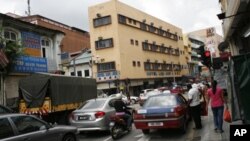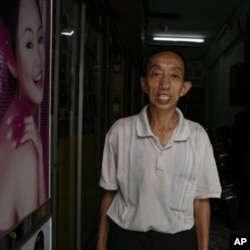Malaysian plans to build a subway in Kuala Lumpur, have sparked protests and allegations of land-grabbing.
Chuah Chee Peng, 56, has been living in Petaling Street, Kuala Lumpur city's historical Chinatown, for more than 40 years. “I grew up watching the landscape of Petaling Street change. These shop houses didn't look like these 40 years ago. But renovations decade after decade keep changing the facade,” he says.
Chuah says the facade of Petaling Street is expected to change even more drastically, after the city's first mass rapid transit (MRT), known as MY Rapid Transit, is completed. The construction project, which could cost between between $12 billion and $17 billion (RM36 billion and RM50 billion), will provide greater linkages in the city center, as well as to the suburban areas of Kuala Lumpur.
Petaling Street, situated in the heart of the city, is earmarked as one of the sites for the MRT.
However, even before tunneling works have begun in Petaling Street, issues involving mandatory land acquisitions by the government have plagued the project.
Slightly over a month ago, shop owners and residents of Sultan Road, situated in Chinatown, were upset when they learned the units situated above a section of the tunnel to be built for the project will be acquired by the government under the Land Acquisition Act.
Chuah lives and works at a street adjacent to Sultan Road. “So far, this street is not affected. But, who knows what will happen in the future?”
The government has said that it is acquiring the shops and land above the tunnel to ensure the safety of the buildings and possibly demolish them, in the event that these buildings are no longer safe for living after the tunnel is completed.
While The Land Public Transport Commission, a government agency overseeing the land acquisitions, has vehemently denied that such acts tantamount to “land-grabbing”, it would not guarantee that the land acquired would be returned to the owners after the construction of the MRT is completed.
Protests against these acquisitions are getting rampant, as the residents and landowners are concerned that the government is attempting to buy off the parcels of land and buildings below market price only to be developed into high-valued commercial properties.
Residents of Sultan Road are not the only ones caught in a quandary over the construction of the MRT. Landowners in Imbi Road and Bukit Bintang Road, also located in the heart of the city center, are challenging the acquisition of their properties for the MRT project.
The landowners of Imbi Road have challenged the acquisitions as “wrongful”, while shop owners in Bukit Bintang Road have staged a protest over the acquisitions of 20 units of shops to make way for tunneling works and an underground station.
Fears of mandatory land acquisitions in the city have compounded in recent months, following notices issued to some residents living in an affluent neighbourhood in the suburbs of Kuala Lumpur that their properties could be acquired for the purposes of building the train system.
Currently, the city already has two train systems running, which is the Light Rail Transit (LRT) and the Monorail. However, the train systems are not sufficient to address the increasing traffic congestion woes in the city.
The MRT project is listed as the country's largest and most important civil infrastructure project under the current Prime Minister Najib Razak's administration under an economic roadmap known as the Economic Transformation Program.
The program, which was unveiled in April this year, outlined key economic areas that the country would leverage to attract foreign direct investments that have been sluggish compared with neighbouring countries such as Indonesia, Thailand and Singapore in recent years.
With 31 stations and 10 million commuters expected after its completion by 2016, Najib has said the MRT project will generate up to $3.7 billion (RM12 billion) worth of other construction projects such as commercial properties and higher residential properties value.
The massive construction project also plays an important part in providing a multiplier effect to sustain the country's economic growth, amid concerns that a global economic downturn will affect its economy.
The Malaysian economy grew 7.2% in 2010, and the government has expected growth to be at 6% this year. However, in a report in August, Goldman Sachs has cut its forecast on Malaysia to 5% from 5.4%, while it projects the economy to grow 5.2%, compared with previous estimates of 5.6%.
Goldman Sachs has said the economy is likely hampered by weaker demand from the US and European markets this year, as well as Malaysia's high budget deficit of 5.4%.










